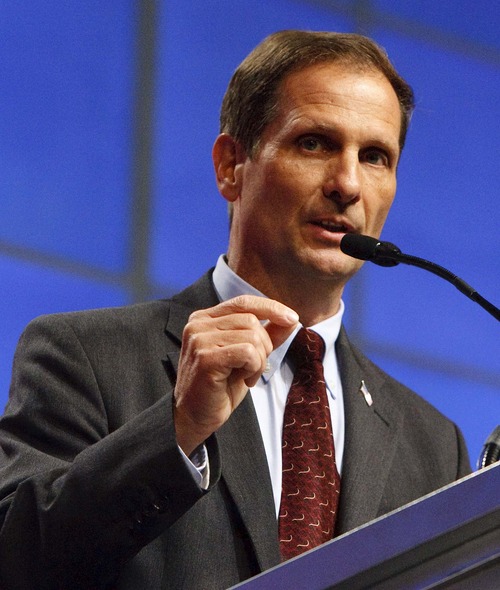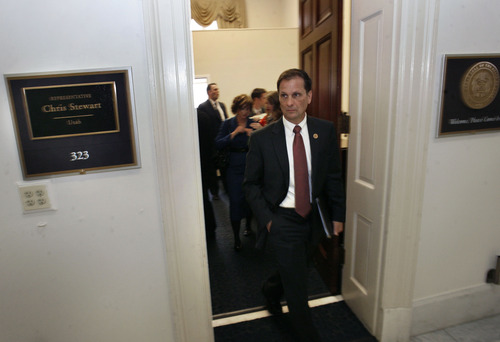This is an archived article that was published on sltrib.com in 2013, and information in the article may be outdated. It is provided only for personal research purposes and may not be reprinted.
Two Utahns have emerged at the center of an ugly fight in Washington over the nation's clean-air laws.
One is newly elected GOP Rep. Chris Stewart. As chairman of the House Environment Subcommittee, he's become a leader this summer in his party's campaign to poke holes in scientific research supporting the U.S. Environmental Protection Agency's health-based pollution regulations over the past 40 years.
The other is C. Arden Pope, a Brigham Young University economist. He's been snagged in the controversy — and even reviled as a "scoundrel" by one blogger — because two key studies he's famous for were targeted in an Aug. 1 subpoena from congressional panels headed by Stewart and Rep. Lamar Smith, a Texas Republican who oversees the House Science Committee.
In the decades since President Richard Nixon signed the Clean Air Act of 1970 into law, the studies have become the foundation of scientific understanding of the links between heart attacks, early death and other health damage.
The EPA has relied on the studies, fortified with the scientific building blocks of thousands of other studies, to justify limits on power plants and other major pollution sources that opponents have been challenging from the start.
In recent months, Senate and House Republicans have revived old complaints about the studies, labeling as "hidden data sets" and "secret science" what scientists regard as confidential data. And, in a letter last month to the EPA, Stewart and Smith demanded the source data, insisting Americans "have a right to know whether EPA's rules are based on sound science or a partisan agenda."
The EPA forwarded the committee's request to Pope, who restated why he cannot give the lawmakers the private data — containing patient records for hundreds of thousands of study volunteers — they've demanded.
"We will be as responsive as we can be without violating the confidentiality agreements," Pope said in an interview.
On Aug. 19, the EPA delivered its response to the subpoena, which Democrats had opposed.
"We are now in the process of reviewing the documents they have provided," said Stewart in an email statement to The Salt Lake Tribune. "Hopefully, they will respect the rights of the American people for a transparent government."
—
Seminal studies • The data the lawmakers want were created around 30 years ago for what are commonly called the Harvard Six Cities study (1993) and American Cancer Society study (1995). But, to use the information, Pope's team, like all researchers, had to agree to safeguard the privacy of around 1.5 million people who had volunteered to share their health and medical information on a confidential basis.
That confidentiality was not just a promise but legally binding, and it's treated as a sacred duty by health care providers, as anyone who's tried to find out the condition of a hospitalized friend knows. Health care providers are barred from giving any information to people who are not family, and they are strictly limited even in what they can tell family.
Meanwhile, the two studies have achieved rock-star status in the health sciences. Pope's work has been scrutinized by the U.S. Supreme Court — and the laws it supported were upheld — when industry challenged the EPA's proposed controls on air pollution, including the brown smog that sometimes leaves northern Utahns gasping for weeks at a time in winter. The studies also survived a grueling re-analysis by an independent government-industry panel called the Health Effects Institute. The review took 31 researchers three years to complete, Pope noted.
"The administration has a responsibility to be honest and open with the American people," Stewart said in his statement. "And the agency has readily admitted the limited information that they had made public was not sufficient for independent validation, replication, or re-analysis of the findings."
Meanwhile, Pope, who got his start looking at the pollution-health link during the Geneva Steel plant shutdowns of the 1980s, noted that this is only the latest attack on research that has withstood the test of time — and the wrath of industry and powerful politicians such as Utah Republican Sen. Orrin Hatch.
In addition, the BYU researcher and his supporters note, the air-pollution papers were not just published in premier peer-reviewed journals, such as the Journal of the American Medical Association, but also used in the peer-reviewed research of hundreds of other scientists who arrived at the same general conclusions — many of them using different raw data.
In the world of science, tests of time and of independent validation like these are gold standards, noted Janice Nolen of the American Lung Association. And these key studies co-written by Pope have achieved that.
"There are thousands of studies that are used in determining the effects of these pollutants," she said. "These are just two of the biggest and the best."
—
'Scientific misconduct' • Meanwhile, in the world of politics, the studies are being attacked as suspect "secret science."
In an article earlier this month, blogger Steve Milloy of JunkScience.com attacked Pope and his work in an article titled: "EPA-funded researcher puts up smokescreen to evade subpoena on EPA 'secret science.' " In it, Milloy calls the BYU researcher "simply a scoundrel" and deems any assertions about the privacy of the raw data "nonsense."
"Pope is t[r]ying [h]is hardest to avoid being exposed to the world as a junk scientist of the highest order," Milloy wrote. "If his research was any good, why would he be trying so hard to hide his data?"
Pope declined to respond to "name-calling." But the blogger's jabs echo criticisms by Stewart and Smith, who suggested that EPA's use of the studies "borders on scientific misconduct" and urged the agency to stop using them.
"We are concerned that EPA's reluctance to respond to congressional requests," they wrote in the July 22 letter to EPA, "or to obtain and assess the data to assure the legitimacy of claimed benefits may reflect weaknesses in the studies."
—
Nothing personal • But Stewart says there's an important distinction between what the congressional panel is attempting and the aim of partisan bloggers.
"The committee's concerns have nothing to do with Dr. Pope or any other single scientist. To suggest that any individual scientist is the objective of the subpoena completely misses the point," he said in his email. "My only concern is with the EPA's previous refusal to grant access to the data produced by taxpayer-funded research."
While Pope has had federal grants to help with his research, the raw data were gathered by and remain the property of private institutions, Harvard University and the American Cancer Society, Pope said.
For Barry Bickmore, a BYU geochemist, the attacks on air-pollution science are the latest examples of "nutty beliefs" about scientific issues from the GOP.
Bickmore, who takes on "climate deniers" in his Climate Asylum blog, said this controversy is the latest example of the manufacturing of uncertainty to accomplish political aims, just as politicians have done in the past to discredit the science surrounding secondhand smoke and the addictiveness of nicotine.
"This is just par for the course," he said. "This is the same thing going on — some of the same people, too."
John Walke, of the Natural Resources Defense Council, had harsher words, calling the science committee's recent actions, "a political vendetta" filled with "shocking falsehoods."
"Their all-too-transparent agenda is to attack clean-air health safeguards that are projected to save tens of thousands of lives and avoid hundreds of thousands of asthma attacks and heart attacks annually," he wrote in a blog post, "while delivering health benefits to Americans that outweigh costs to polluters by tens of billions of dollars."
Twitter: @judyfutah —
More on air pollution science
C. Arden Pope, a Brigham Young University economist whose research on the air pollution-and-health link is seminal, gave a short history of air pollution research this spring at the University of Utah. Here's a link: http://stream.utah.edu/m/dp/frame.php?f=aa1124c99a69e6102525.





